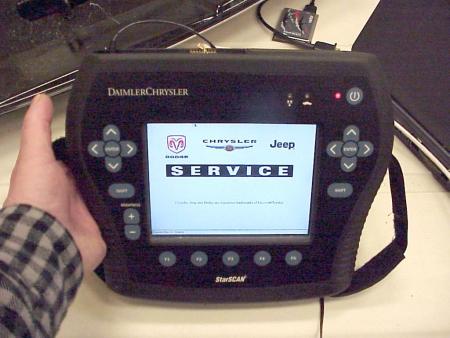Device Profile: Daimler-Chrysler StarScan automotive diagnostics tool
May 5, 2004 — by LinuxDevices Staff — from the LinuxDevices Archive — 161 viewsDaimler-Chrysler has used real-time embedded Linux in a portable automotive diagnostic tool currently shipping to dealers and repair shops. The StarScan tool enables shops to work on 2004-model year and later Dodge, Chrysler, and Jeep vehicles incorporating CAN (controller area network) buses.

StarScan is packaged in a small, rugged, ergonomic case
(Click for larger view)
CAN, a patented serial bus system developed by Robert Bosch GmbH, is currently emerging as a popular way to network “intelligent” devices as well as sensors and actuators within automotive systems and sub-systems. The 2004 Dodge Durango was the first Daimler-Chrysler vehicle to use a CAN bus, and Dodge dealers began receiving StarScan devices to support Durango diagnostics in August of 2003.
Why real-time Linux?
The StarScan device will eventually also support legacy networking protocols used in older Daimler-Chrysler vehicles. In fact, support for older protocols was a key factor why board supplier and engineering consultant BrightStar Engineering chose to use FSMLabs's RTLinuxPro, a dual-kernel operating system with a small real-time kernel that runs a full Linux (or BSD) OS as its idle task.
Stuart Adams of BrightStar explains that real-time requirements were driven by “various quirky timing requirements particularly for older (legacy) protocols. For example, you may have to send data to a UART at 9600 baud, but provide a 1500 microsecond gap between bytes. There are lots of odd timing things like this . . . you could probably handle them without RT, but the resulting software would be more complex and less portable.”
Standard networking, and other features
Along with real-time performance, the StarScan features standard internet connectivity in a light-weight, 2.6-lbs device with low power requirements.
The StarScan can be powered by an internal battery, a 12-volt vehicle battery, or an external wall-wart style power transformer. It comes with a docking/recharging station that can also connect it to a PC or a LAN. Firmware updates and automotive repair bulletins can be downloaded over the Interet or from PCs on a local LAN.
The StarScan also includes a PCMCIA slot, and can also support optional wireless LAN connections using WiFi cards from Avaya (formerly Orinoco, formerly Lucent Technologies) or from Cisco's 350 series.
The StarScan includes a 6.4-inch color VGA (640×480) LCD touchscreen display. It has 16MB of integral Flash memory, as well as 512MB of CompactFlash storage and 128MB of SDRAM. It also includes a Secure Digital (SD) memory card slot, and USB ports for optional keyboard, mouse, CR-ROM, printer, and other peripherals.
Real-time statistics
The StarScan is based on a single board computer with an AMD Alchemy AU1000 embedded processor. The board was designed specifically for automotive applications by BrightStar Engineering. FSMLabs lists the following real-time specifications for RTLinuxPro running on the StarScan's SBC:
- Clock Resolution 2.52 ns, 396 MHz
- Context Switch – Realtime thread to Realtime thread: 22.3 us
- Scheduling Jitter: 42.2 us
- Interrupt Latency: 10.6 us
- Interrupt Thread Latency – Realtime ISR to Realtime thread (via Semaphore): 22.0 us
- Interrupt Thread Latency – No reschedule (via Semaphore): 30.0 us
- Thread Yield – Realtime thread to Realtime thread: 9.4 us
- Thread Cancellation: 10034.7 us
- Semaphore Latency: 28.3 us
- Uncontested Mutex Acquisition: 8.0 us
- Contested Mutex Acquisition: 25.9 us
- Pthread Condition Variable Latency: 25.6 us
- Uncontested Spinlock Acquisition: 14.7 us
- Contested Spinlock Acquisition: 23.7 us
FSMLabs also supports BrightStar boards that use the AMD AU1100 and Motorola's automotive chip, the MPC5200.
This article was originally published on LinuxDevices.com and has been donated to the open source community by QuinStreet Inc. Please visit LinuxToday.com for up-to-date news and articles about Linux and open source.